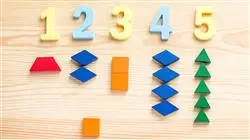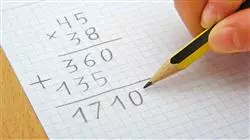University certificate
The world's largest faculty of education”
Introduction to the Program
This 100% online TECH program will bring you up to date on the state-of-the-art in didactics, including the contributions of the intelligence bits method"

The so-called “traditional teaching” is undergoing an intense process of updating due to the vertiginousness with which increasingly disruptive didactic models have appeared. In disciplines such as mathematics, these innovations have a significant weight, since they help children in kindergarten and primary education to approach the complexities of the subject without added fears. One of the most important academic strategies in this area has been the intelligence bits method, where creativity plays a fundamental role in learning.
At the same time, the different academic vanguards assure that the teachers of the subject achieve better results among their students when they manage to combine “conventional” strategies with the most cutting-edge criteria. In this way, it is evident that mathematics teachers must be up-to-date with the latest advances related to this school subject in order to be able to transmit knowledge in a comprehensive manner.
In relation to this situation, this Postgraduate certificate provides a unique opportunity to broaden their theoretical and practical training on contemporary resources for the development of mental arithmetic. Also, the participants in the program will enhance their competencies for the creation of materials and games to work with numbers in class. At the same time, they will be able to analyze the most recent evaluation criteria and how to meet the demands of students with high abilities or learning difficulties during the educational process.
This program also includes complementary readings, explanatory videos and other multimedia resources that will enrich this academic experience. All this, from a complete 100% online platform and through the innovative Relearning system. This way, TECH provides an unparalleled program that stands out for the comfort it guarantees to its graduates, avoiding travel to an on-site study center and providing access to the contents 24 hours a day.
With TECH, you will have access to unique contents in the area of Didactics of Mathematics, with which you will be one step ahead in the field of Early Childhood Education"
This Postgraduate certificate in Principles of Didactic Methodology for the Teaching-Learning of Mathematics in Pre-school Education contains the most complete and up-to-date educational program on the market. The most important features include:
- The development of practical cases presented by experts in Arithmetic, Algebra, Geometry and Measurement
- The graphic, schematic, and practical contents with which they are created, provide practical information on the disciplines that are essential for professional practice
- Practical exercises where the self-assessment process can be carried out to improve learning
- Its special emphasis on innovative methodologies
- Theoretical lessons, questions to the expert, debate forums on controversial topics, and individual reflection work
- Content that is accessible from any fixed or portable device with an Internet connection
Thanks to this academic program, you will obtain new teaching mechanisms focused on the main theories of creativity"
The program’s teaching staff includes professionals from the field who contribute their work experience to this educational program, as well as renowned specialists from leading societies and prestigious universities.
The multimedia content, developed with the latest educational technology, will provide the professional with situated and contextual learning, i.e., a simulated environment that will provide immersive education programmed to learn in real situations.
This program is designed around Problem-Based Learning, whereby the professional must try to solve the different professional practice situations that arise during the academic year For this purpose, the students will be assisted by an innovative interactive video system created by renowned and experienced experts.
Delve into the teaching of Mathematics and become a prestigious educator for Early Childhood and Primary Education"

Update yourself with TECH about a field that is constantly changing, gaining broad competencies for the design of didactic games"
Why study at TECH?
TECH is the world’s largest online university. With an impressive catalog of more than 14,000 university programs available in 11 languages, it is positioned as a leader in employability, with a 99% job placement rate. In addition, it relies on an enormous faculty of more than 6,000 professors of the highest international renown.

Study at the world's largest online university and guarantee your professional success. The future starts at TECH”
The world’s best online university according to FORBES
The prestigious Forbes magazine, specialized in business and finance, has highlighted TECH as “the world's best online university” This is what they have recently stated in an article in their digital edition in which they echo the success story of this institution, “thanks to the academic offer it provides, the selection of its teaching staff, and an innovative learning method aimed at educating the professionals of the future”
A revolutionary study method, a cutting-edge faculty and a practical focus: the key to TECH's success.
The most complete study plans on the university scene
TECH offers the most complete study plans on the university scene, with syllabuses that cover fundamental concepts and, at the same time, the main scientific advances in their specific scientific areas. In addition, these programs are continuously being updated to guarantee students the academic vanguard and the most in-demand professional skills. In this way, the university's qualifications provide its graduates with a significant advantage to propel their careers to success.
TECH offers the most comprehensive and intensive study plans on the current university scene.
A world-class teaching staff
TECH's teaching staff is made up of more than 6,000 professors with the highest international recognition. Professors, researchers and top executives of multinational companies, including Isaiah Covington, performance coach of the Boston Celtics; Magda Romanska, principal investigator at Harvard MetaLAB; Ignacio Wistumba, chairman of the department of translational molecular pathology at MD Anderson Cancer Center; and D.W. Pine, creative director of TIME magazine, among others.
Internationally renowned experts, specialized in different branches of Health, Technology, Communication and Business, form part of the TECH faculty.
A unique learning method
TECH is the first university to use Relearning in all its programs. It is the best online learning methodology, accredited with international teaching quality certifications, provided by prestigious educational agencies. In addition, this disruptive educational model is complemented with the “Case Method”, thereby setting up a unique online teaching strategy. Innovative teaching resources are also implemented, including detailed videos, infographics and interactive summaries.
TECH combines Relearning and the Case Method in all its university programs to guarantee excellent theoretical and practical learning, studying whenever and wherever you want.
The world's largest online university
TECH is the world’s largest online university. We are the largest educational institution, with the best and widest online educational catalog, one hundred percent online and covering the vast majority of areas of knowledge. We offer a large selection of our own degrees and accredited online undergraduate and postgraduate degrees. In total, more than 14,000 university degrees, in eleven different languages, make us the largest educational largest in the world.
TECH has the world's most extensive catalog of academic and official programs, available in more than 11 languages.
Google Premier Partner
The American technology giant has awarded TECH the Google Google Premier Partner badge. This award, which is only available to 3% of the world's companies, highlights the efficient, flexible and tailored experience that this university provides to students. The recognition as a Google Premier Partner not only accredits the maximum rigor, performance and investment in TECH's digital infrastructures, but also places this university as one of the world's leading technology companies.
Google has positioned TECH in the top 3% of the world's most important technology companies by awarding it its Google Premier Partner badge.
The official online university of the NBA
TECH is the official online university of the NBA. Thanks to our agreement with the biggest league in basketball, we offer our students exclusive university programs, as well as a wide variety of educational resources focused on the business of the league and other areas of the sports industry. Each program is made up of a uniquely designed syllabus and features exceptional guest hosts: professionals with a distinguished sports background who will offer their expertise on the most relevant topics.
TECH has been selected by the NBA, the world's top basketball league, as its official online university.
The top-rated university by its students
Students have positioned TECH as the world's top-rated university on the main review websites, with a highest rating of 4.9 out of 5, obtained from more than 1,000 reviews. These results consolidate TECH as the benchmark university institution at an international level, reflecting the excellence and positive impact of its educational model.” reflecting the excellence and positive impact of its educational model.”
TECH is the world’s top-rated university by its students.
Leaders in employability
TECH has managed to become the leading university in employability. 99% of its students obtain jobs in the academic field they have studied, within one year of completing any of the university's programs. A similar number achieve immediate career enhancement. All this thanks to a study methodology that bases its effectiveness on the acquisition of practical skills, which are absolutely necessary for professional development.
99% of TECH graduates find a job within a year of completing their studies.
Postgraduate Certificate in Principles of Didactic Methodology for the Teaching-Learning of Mathematics in Pre-school Education
During the first school years, one of the fundamental pillars for the correct academic development is the mathematical understanding and comprehension that allows each student to assimilate in a simple way the numerical, graphic and equation formulas. Since this subject is usually complex for elementary school students, it is necessary that teachers have the required skills to teach this subject properly. At TECH Global University we have developed a Postgraduate Certificate in Teaching Methodology Principles for the Teaching-Learning of Mathematics in Pre-school Education. A virtual Postgraduate course that, in addition to covering the latest teaching methods, includes in its curriculum a unique syllabus designed by high-level experts. Throughout two months of theoretical and practical training, you will obtain the necessary knowledge to simplify the teaching processes of this discipline, through the use of didactic resources and playful activities such as games. In addition, you will learn how to use multimedia resources to teach the main concepts of the area in a practical, agile and efficient way. After completing this online program, you will be able to foster logical-mathematical thinking in your students, through the most innovative methodology in the educational sector.
Specialize in promoting innovative strategies in the teaching of mathematics
At TECH we are committed to quality teaching based on new educational technologies, therefore, we designed the structure of the Postgraduate Certificate in conjunction with professionals belonging to the best schools in the country. Motivated to facilitate your learning process, we divide the concepts of the syllabus into dynamic modules supported by telepractice. In this way, you will explore the different techniques of mathematical study, including the project method (steps to solve a practical problem), didactic transposition and playful activities (games, recreational workshops). You will also delve into the management of pedagogical variables, inferential elements in early childhood education and intelligence bits (visual or auditory stimuli). From there, you will manage to impart mathematical knowledge in a totally assertive way and avoid common mistakes present in the learning of the subject.







